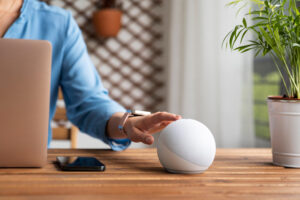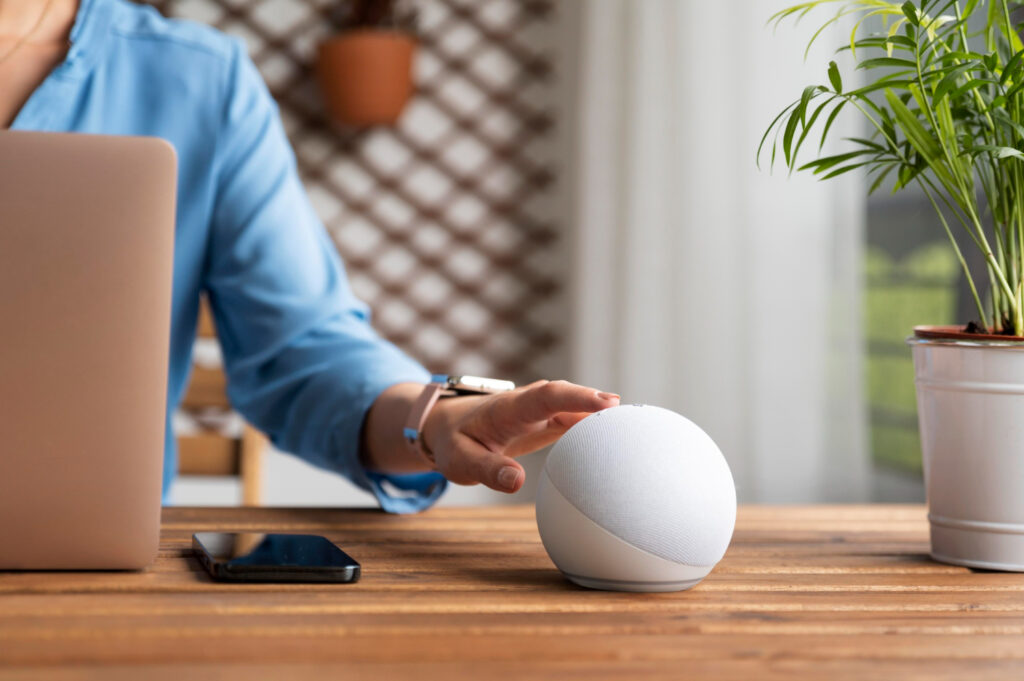The idea of smart homes has been seen in many films and shows, but now, the possibility has come into people’s lives. This new advancement enables residents of homes to manage different features of the homes using devices that are connected to the internet. Some of the changes include the ability to control the temperature in the home, monitor active cameras among many others. This article aims at explaining the general concept of smart home technology, its advantages, applications of this technology, and an outlook to the thriving market.
What is Smart Home Technology?
Home automation or Smart home technology refers to the usage of systems and appliances in a home where such systems can be controlled with the help of a computer Tablet, or smartphone remotely. These are connected devices which allow users to interact and regulate several processes through the web, lighting, heating, safety, and entertainment. A smart home system therefore incorporates a wise control system and a wireless connection, smart devices.
key components of a smart home including;
Smart Devices: These are the individual devices which can be operated from a distance with the help of internet connection such as smart thermostat, light, lock, camera, appliance etc.
Central Hub or Control System: This is the main control panel for the smart home system, which is best represented by a smart speaker or an app that links all the smart gadgets together.
Internet Connection:As an internet connection is needed to create a connection between the devices and the user, a stable connection is essential to the operation of smart home gadgets.
Advantages of Smart Home System
Smart home technology is beneficial in many ways, thus it is considered as an advantage to have smart home technology.
Convenience and Control
Another advantage of smart home systems is that it offers comfort to its users due to its capability to manage various tasks in the home. By having touch-points with several facilities of the home, users can manipulate several attributes of their environment from different parts of the globe. Smart home devices are convenient as they allow the user to control almost everything in his home starting with switching off the lights, closing of doors, or even regulating the temperature.
Energy Efficiency
In its own words, it can also be stated that smart home technology impacts positively on energy conservation features of a home since it enables homeowners to track how much energy is being used. Some devices such as smart thermostats can be programmed to recognize the user’s patterns and automatically adjust the heating and cooling losts to avoid wastage. Moreover, smart lighting systems can be programmed to switch off when there is no activity and this would also help to save energy.
Enhanced Security
Most of property holders find that keeping their homes secure is a critical concern, and savvy home innovation gives progressed strategies for doing exactly that. Doorbell cameras, movement finders, savvy locks, and reconnaissance cameras are a couple of sorts of brilliant security frameworks. They are likewise fit for creating notices of any occasions on the proprietor’s cell phone, so the property holder would have the option to manage anything undermining right away.
Customization and Personalization
Smart home technology is highly customizable which means the users can set different scenarios that are best suited to their routines. For example, there are scenarios under which a user can define smart routines which change the lighting, height and the type of music according to the time of the day or the individual’s preference. This level of customization improves the overall quality of living within the home so as to make it even more comfortable.
The integration with other smart devices
Smart home technology is produced to work closely with other smart objects, so everything is interconnected and closely linked. This integration makes it possible to create perfect compatibility between devices and more especially in regulating various aspects within a home. For instance, by using an embedded voice command one can ask the smart house to adjust the lighting, play music and also recite the weather forecast.
Smart Home technology in Smart home devices & Applications
Smart home technology is defined by one or many applications that are intended to improve various aspects of home dwelling. Below are some of the most popular applications:Below are some of the most popular applications:
Smart Lighting
Smart lighting systems enable users to adjust the lighting of homes from a comfort of a distance. Such systems can be pre-set to dim or change color, respond to specific time of the day or people’s presence in the room. Smart lighting can also be coupled with other devices like motion sensors that allow the lighting of a place whenever a person arrives in the room.
Smart Thermostats
Taking the examples of Nest and Honeywell from the recent innovations, smart thermostats are intended for maintaining the temperature within a home. It tends to understand the user’s behavior, his or her routines, and even climatic conditions to optimize the temperature and reduce power consumption. Some of the smart thermostats have energy usage reports, which assists the homeowners in finding ways to cut down their bills.
Smart Security Systems
Smart security systems are multi-faceted systems that provide solutions for home security. Such systems involve equipment like cameras including doorbell cameras, motion detectors, and smart locks. Currently, homeowners can observe their homes through a smartphone, receive notifications regarding suspicious activity or simply converse with the guests.
Smart Appliances
Smart fridges, smart ovens, smart washing machines and other devices are created to simplify the work of people at home. These appliances can be operated from a distance which means that a user can start a cycle or stop it, change some settings or get a notification that a particular task has been accomplished. For instance, vision-aware interaction can be used in a smart refrigerator where it is possible to monitor the store, recommend a recipe based on the available stock.
Smart Entertainment Systems
Smart entertainment systems are devices such as smart TVs, smart speakers and streaming devices. The users can manage these systems either by speaking to the devices directly or through the smartphone applications – creating a perfect home entertainments’ environment. Users are able to watch content, pause or select the track to play, even embed their home theater systems with other smart appliances for a whole home experience.
Smart Home – The Technology Of Tomorrow
Smart home technology is bound to continue improving in the future years as new investment is made in it. As our society advances will smart homes become even smarter equipped seamlessly to communicate with devices produced by other companies? Also, continuous advancements in AI and machine learning will add to enhance the functionality to smart home systems as these advanced features would allow the system to learn from the users and develop from there.
Enlarging of the Smart Home Systems
Consequently, the consideration of an expansion of smart home ecosystems is made possible through the further development of smart home technology. This will mean there will be more devices which can talk and interoperate, thus providing consumers with a more coherent smart home ecosystem. Another factor that is expected to boost the interactions of smart home devices are the effects of 5G technology.
The vigorous security level and the emphasis on the privacy of users.
As the applications of connected devices in smart homes rise, there will be higher concern on security and privacy. I expect manufacturers to come up with even better security enhancements in order to shield users of devices from possible cyber threats.
Sustainability and Energy Efficiency
Sustainability and energy efficiency will also be the focus on sustainability and energy saving. With increasing consciousness towards environmental issues and energy consumption the gadgets of smart homes will be eco-friendly. This could encompass improvement of efficiency of such appliances as electric lighting and standardized appliances, better incorporation of RE technologies such as solar and wind energy systems, and efficient energy control systems.
AI-Powered Smart Homes
AI is expected to be a core component of how smart homes will look like in the future. AI will be integrated into the applications and systems that will be used, and then it will be possible to take advantage of its presence to ensure that users’ behavior is monitored and that targeted and personalized services are offered while other tasks are carried out automatically. For this, for instance, an AI-enabled smart home technology would fill the role of adjusting the home’s lighting, temperature or security system according to the life of the user thereby making it more smart and efficient.
Conclusion
Concept of smart home system is making habitation convenient and comfortable as never before for giving absolute control on various systems. Thus, it can be stated that we could look forward to even more connected, secure and sustainable homes as the technology is developing. Depending on your needs, smart home technology provides numerous possibilities to make a home more secure, more energy-efficient, or just more suited to the dweller’s preferences. When looking towards the future and further integration of our homes with smart technology, it is certain that a smart home will be a defining part of the residential experience of future generations.









